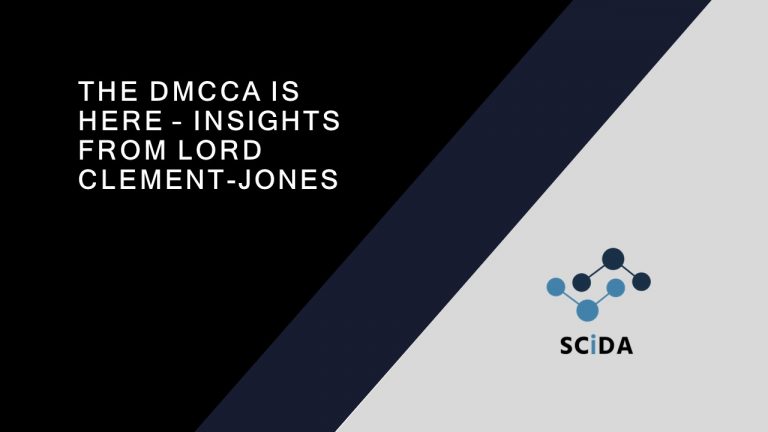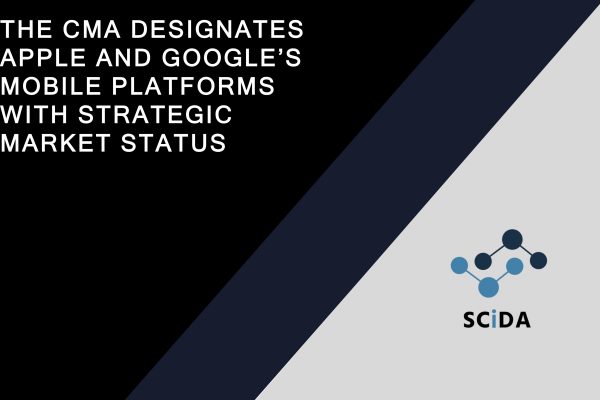
The Digital Markets, Competition & Consumers Act has passed Royal Assent on the 24th of May 2024. It has been a long way here since the revolutionary 2016 Furman Report, and the work for the CMA´s Digital Markets Unit now begins (and they are not sitting still, looking at the draft guidance that was issued just 2 days after the DMCC was adopted). There is a lot to say about the new piece of legislation, and who better to ask than Lord Timothy Clement-Jones. Our very own Oles Andriychuk has shared a cup of (digital) tea with Lord Clement-Jones to discuss the DMCC, the legislative process, and where we go from here.
By Oles Andriychuk
Lord Timothy Clement-Jones is a distinguished British politician and a member of the House of Lords, recognized for his extensive work in law, business, and public policy. A former solicitor, he has held prominent roles in various legal and corporate sectors, including serving as the London managing partner of DLA Piper, a global law firm. Lord Clement-Jones has been an influential advocate on issues ranging from digital rights and data protection to the creative industries and health policy. His contributions to public service and policy-making are underscored by his commitment to fostering innovation and ethical governance in the digital age.
For this interview, the questions by Oles Andriychuk are presented in bold and the answers by Lord Clement-Jones are in italics.
Oles Andriychuk – Lord Clement-Jones, thank you for agreeing to answer some of the questions for the readership of the SCiDA blog. First of all, congratulations on the Digital Markets, Competition and Consumers Act receiving finally the Royal assent. The UK started on the journey of introducing a new pro-competition regime for digital markets together with – and indeed as part of – the EU. While EU Digital Markets Act is already fully operational, it has taken much longer for the DMCCA. Many people criticise this. Many on the contrary say it is a prudent strategy for such an experimental regime. History will answer who is right. But can you please provide to us a summary of UK legislative process? At what point do we see the slowdown? How common this situation is in comparison with other legislative proposals?
Lord Clement-Jones – There is no doubt that the UK progress towards ex ante legislation has been slow. The Furman Report was completed some 5 years ago and was widely praised for its conclusions. Yet it has taken this time – only in the past two days-to see the legislation finally pass with new powers for the Competition and Markets Authority and the new Digital Markets Unit being set up. This has been because of a prevailing culture in the Conservative Government that regulation – even competition regulation – threatens to be the enemy of innovation. The EU has been more robust. The issue is not whether our UK Parliamentary processes are too slow. Once this bill arrived in Parliament there was a great willingness to see this through quickly. The problem was that late in the Commons Stages the Government decided to water down the Bill making it more favourable to the interests of Big Tech in terms of the definition of the countervailing benefit exemption, circumstances in which a penalty could be appealed, and the definition of when a decision by the CMA could be challenged. As a result, the bill met resistance in the Lords which was only recently resolved.
One of the key elements of the new regime supposed to be the mechanism of the regulatory dialogue. It has many important trajectories – not only the one engaging the CMA and designated undertakings. To paraphrase and to use metaphorically, we also see the dialogue between the co-legislators. And you are one of the most engaged and impactful Members of the House of Lords taking part in it. Can you please explain the main stages of the dialogue with the Government? How much was it willing to take onboard in terms of the proposed amendments during different levels of co-legislative scrutiny of the Bill? Is it better to be comprehensive and to offer a catalogue of interlinked changes to the Bill or rather to be selective, trying to propose minor amendments?
In general, the Government will normally engage in dialogue with legislators, particularly in the Lords between Committee and Report Stages, after the arguments for amendment have been made and unpacked in Committee. In a number of areas, particularly the consumer elements of the bill, the Government did usefully engage and bring forward amendments, e.g., on fake reviews. They did not constructively engage on the Digital markets’ elements of the bill, except one small area as regards the Secretary of State’s approval of the Code of Conduct drafted by the CMA.
What are your views about different parts of the Bill? For many looking at it from competition policy perspective, the parts on Competition and the parts of Consumer Protection are of very different nature. Do you agree? What are the reasons for having them in the same legislative act? And maybe very briefly explain to us the main objectives and novelties of the parts dealing with consumer protection issues.
I think this purely convenience, especially now different Government departments are involved DSIT for Digital Competition and DBT for Consumer issues. Both the Consumer aspects were overdue and so were the Digital Competition proposals. If legislation had come forward say 2 years ago then it would have been a single Department, BEIS, that would have proposed the bill.
Moving back to digital markets, we had a chance to discuss the Bill within the Digital Markets Research Hub and we both were of a view that while being generally a very promising legal mechanism, the Bill contains two provisions which could undermine its effective enforcement. The first pitfall concerns the provision of Section 5 when for the purposes of designating a relevant undertaking with a special position of “strategic market status” the CMA is required among other things to evaluate if the undertaking has a substantial and entrenched market power, and the mechanism of doing so is at least 5 years forward looking assessment. Could you please elaborate on the potential risks with the requirement being formulated in this shape, and on the progress on this matter?
I think that has now been usefully clarified during the legislative process and Ministers have asserted that there is flexibility for the CMA/DMU to look at behaviour both past and future in making this assessment.
Can you please update us also on the development with the second problematic element: the provision of Section 29 – the duty of the CMA to close a conduct investigation “where representations made by the undertaking to which the investigation relates lead the CMA to consider that the countervailing benefits exemption applies” (efficiency defence)?
This is less reassuring but at ping pong stage we received assurance that the new wording was the equivalent of the old indispensable formula. The following citation of the Minster is used to exemplify:
I now turn to the Motion tabled by the noble Lord, Lord Clement-Jones, in respect of the countervailing benefits exemption. I thank the noble Lord for his engagement with me and the Bill team on this important topic. The noble Lord has asked for clarification that the “indispensability” standard in Section 9 of the Competition Act 1998, and the wording, “those benefits could not be realised without the conduct”, are equivalent to each other. I want to be clear that the exemption within this regime and the exemption in Section 9 of the Competition Act 1998 are different. This is because they operate in wholly different contexts, with different criteria and processes. This would be the case however the exemption is worded in this Bill. That is why the Explanatory Notes refer to a “similar” exemption, because saying it is “equivalent” would be technically incorrect.
Having said that, the “indispensability” standard and the threshold of the Government’s wording, “those benefits could not be realised without the conduct”, are equally high. While the exemptions themselves are different, I hope I can reassure noble Lords that the Government’s view is that the standard—the height of the threshold—is, indeed, equivalent. The Government still believe that the clarity provided by simplifying the language provides greater certainty to all businesses, while ensuring that consumers get the best outcomes”.
“Col 496 14th May 2024
Viscount Camrose
I still have concerns about the interpretation but again we have had to rely on assurances.
With or without the abovementioned potential pitfalls, the new regime does appear to delegate to the CMA many new discretionary competences, and this raises the question in terms of what should be the North Star for the CMA in exercising these discretionary powers. Of course, the Authority does and will enjoy independence, but do you think the communication links and protocols between the CMA and the Parliament, and the Government should be also revised? Maybe also allude on the recent Report of the House of Lord Committee on the relationship of UK regulators with the Parliament and Government?
The accountability of regulators to Parliament – including the key Economic regulators such as the CMA and FCA in the performance of their duties – is of great importance. As we have emphasized in the Industry and Regulators Committee Report “Who Regulate The Regulators” not only do Select Committees need to be more proactive in the way they do this but also some kind of performance assessment body (akin to the NAO) would be an important addition to Parliament’s ability to scrutinize.
In addition to being a parliamentarian, you are also an experience lawyer. What is the role of the CAT in the new constellation envisaged by the DMCCA. The level of judicial scrutiny has been also at the centre of the discussions. Where are we now? And more broadly, we understand that one of the main features of the new regime is agility. The CAT can slowdown and refocus the performance of the new regime by accentuating less important issues. Without going into details, do you think the CAT should also be somehow mindful of the specificity of the new regime and allow for the CMA a larger discretionary mandate? Will the CAT be pro-enforcement?
Sadly, that is one of the areas where I cannot judge how the use of the powers will unfold. But some commentators believe that the CMA will still lack the necessary speed to enforce its interim decisions and that as with the EU rules Big Tech will engage in significant rear-guard actions in court over regulatory decisions.
What is the end-goal of the new regime? Should its performance be assessed against its contribution to the broader competitiveness of UK digital markets on the global scale?
We should definitely judge on outcomes. Already in new fields such as Generative AI we are seeing market concentration due to the expensive and scarce resources needed: compute power, data set size, expert skills needed and semiconductor sophistication. The test will be whether in these new markets we can prevent the monopolies and oligopolies we have experienced to date and to some extent too roll back the tide.
Lord Clement-Jones, thank you for your work on the DMCCA and for answering our questions. Dear Readers, if you would like to watch a more detailed 2023 interview with Lord Clement-Jones on the DMCCA and beyond – please consult this link.





